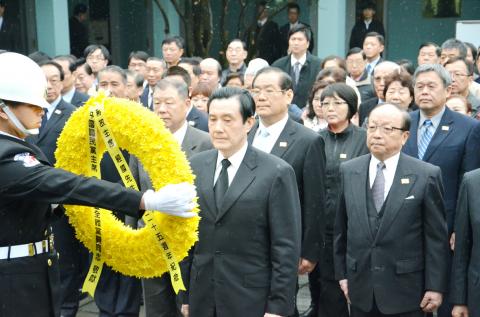President Ma Ying-jeou (馬英九) yesterday visited former president Chiang Ching-kuo’s (蔣經國) mausoleum in Touliao (頭寮), Taoyuan County, to commemorate the 25th anniversary of his death, remaining tight-lipped about the Democratic Progressive Party’s (DPP) rally against his administration.
The president arrived at the mausoleum at about 10am, leading top Chinese Nationalist Party (KMT) officials to pay homage and staying a while in front of the former president’s picture.
He shook hands with supporters on leaving the mausoleum, but did not comment when asked about the DPP’s “Fury” rally against the government.

Photo: Chiu Yi-tung, Taipei Times
As protesters took to the streets to express their anger at the government in Taipei, Ma was not scheduled to attend any other public events yesterday.
Presidential Office spokesman Fan Chiang Tai-chi (范姜泰基) said Ma went over government documents yesterday afternoon while monitoring the situation at the rally.
KMT spokesman Yin Wei (殷瑋) said the party’s Culture and Communication Committee was paying close attention to the rally and the responses to the event, dismissing concerns about the KMT’s attempt to downplay the protest.
The Ma administration has failed to give a positive response to three DPP demands: a Cabinet reshuffle, support of anti-media-monopoly acts and a national affairs conference.
While dismissing the DPP’s calls for a reshuffle and a national affairs conference, the government stressed its efforts to prevent media monopolization. This followed a move by a consortium — including pro-China Want Want China Times Group (旺旺中時集團) chairman Tsai Eng-meng (蔡衍明) — to acquire Next Media Group’s (壹傳媒集團) Taiwanese assets, which sparked debate about growing Chinese influence on Taiwanese media and the concentration of media ownership in the hands of conglomerates.
On Friday the KMT caucus backtracked on its previous support of the DPP’s proposed amendments to the Radio and Television Act (廣播電視法), the Satellite Broadcasting Act (衛星廣播電視法) and the Cable Television Act (有線電視法), arguing that a specific law regulating media ownership is needed.
Premier Sean Chen (陳沖) said yesterday during a visit to Nantou that the Cabinet had already declared its determination to prevent the monopolization of any businesses, including the media industry, and will support the National Communications Commission in drafting a specific law to address issues related to media ownership.
“The Executive Yuan was already working hard to revive the economy and address concerns about media monopolization before the DPP presented its demands at the rally,” he said.

AGING: As of last month, people aged 65 or older accounted for 20.06 percent of the total population and the number of couples who got married fell by 18,685 from 2024 Taiwan has surpassed South Korea as the country least willing to have children, with an annual crude birthrate of 4.62 per 1,000 people, Ministry of the Interior data showed yesterday. The nation was previously ranked the second-lowest country in terms of total fertility rate, or the average number of children a woman has in her lifetime. However, South Korea’s fertility rate began to recover from 2023, with total fertility rate rising from 0.72 and estimated to reach 0.82 to 0.85 by last year, and the crude birthrate projected at 6.7 per 1,000 people. Japan’s crude birthrate was projected to fall below six,

US President Donald Trump in an interview with the New York Times published on Thursday said that “it’s up to” Chinese President Xi Jinping (習近平) what China does on Taiwan, but that he would be “very unhappy” with a change in the “status quo.” “He [Xi] considers it to be a part of China, and that’s up to him what he’s going to be doing, but I’ve expressed to him that I would be very unhappy if he did that, and I don’t think he’ll do that. I hope he doesn’t do that,” Trump said. Trump made the comments in the context

SELF-DEFENSE: Tokyo has accelerated its spending goal and its defense minister said the nation needs to discuss whether it should develop nuclear-powered submarines China is ramping up objections to what it sees as Japan’s desire to acquire nuclear weapons, despite Tokyo’s longstanding renunciation of such arms, deepening another fissure in the two neighbors’ increasingly tense ties. In what appears to be a concerted effort, China’s foreign and defense ministries issued statements on Thursday condemning alleged remilitarism efforts by Tokyo. The remarks came as two of the country’s top think tanks jointly issued a 29-page report framing actions by “right-wing forces” in Japan as posing a “serious threat” to world peace. While that report did not define “right-wing forces,” the Chinese Ministry of Foreign Affairs was

PREPAREDNESS: Given the difficulty of importing ammunition during wartime, the Ministry of National Defense said it would prioritize ‘coproduction’ partnerships A newly formed unit of the Marine Corps tasked with land-based security operations has recently replaced its aging, domestically produced rifles with more advanced, US-made M4A1 rifles, a source said yesterday. The unnamed source familiar with the matter said the First Security Battalion of the Marine Corps’ Air Defense and Base Guard Group has replaced its older T65K2 rifles, which have been in service since the late 1980s, with the newly received M4A1s. The source did not say exactly when the upgrade took place or how many M4A1s were issued to the battalion. The confirmation came after Chinese-language media reported